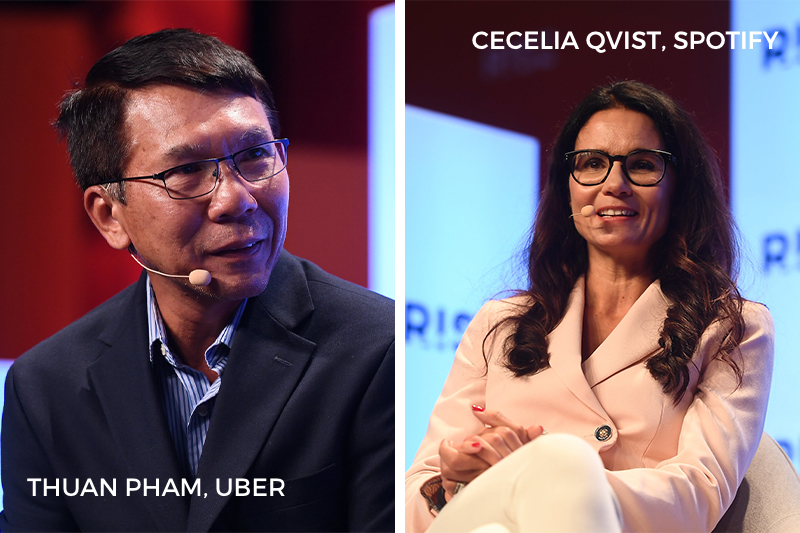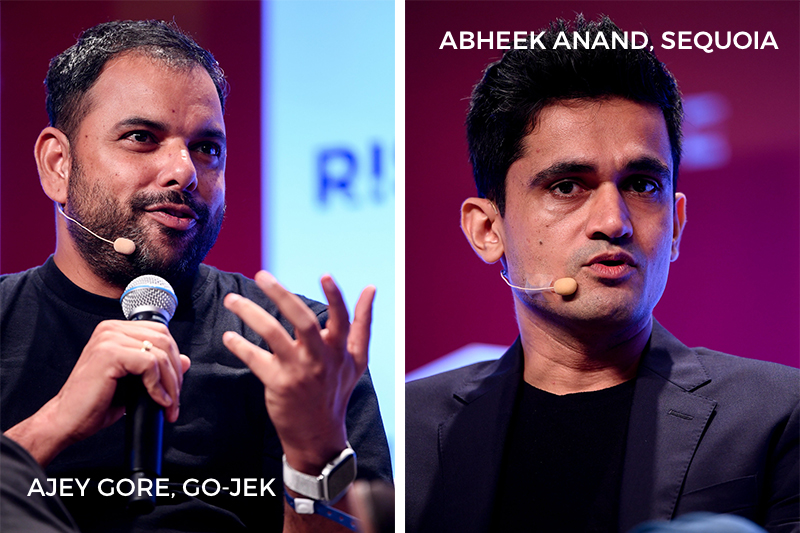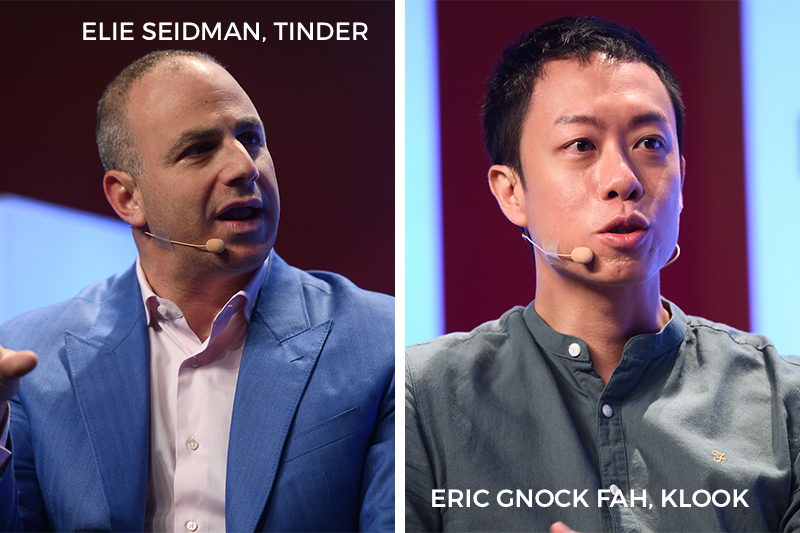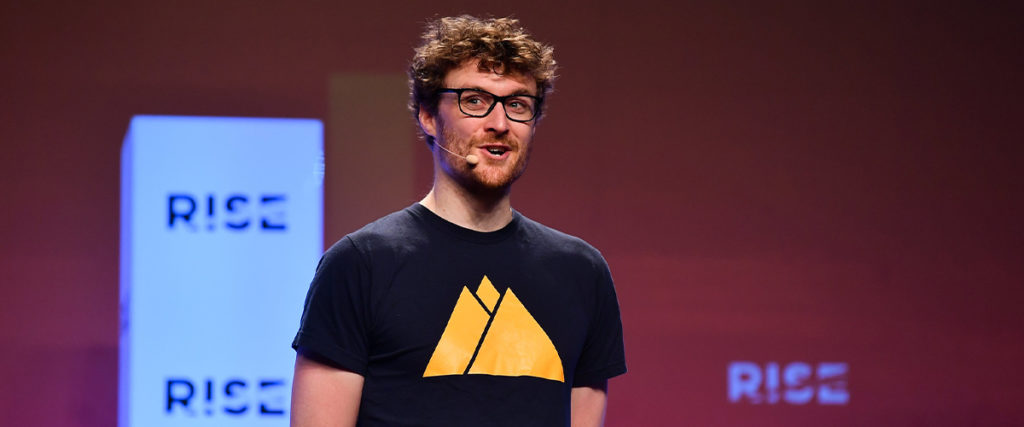With RISE 2019, Asia’s largest tech conference spanning from 9 – 11 July, having concluded last week, here we summarise seven key speakers and the takeaways that emerged across this year’s event in Hong Kong.
This year, Asia’s largest and most exciting tech conference welcomed over 16,000 attendees from 114 countries, 385 speakers and 777 startups through the doors of the Hong Kong Convention and Exhibition Centre in Wan Chai, Hong Kong. From July 9 to 11, halls were bustling with panels and pitches, talks, interviews and a whole lot of networking.
Now in its fifth year, RISE saw its best gender ratio in its history with 40% of its attendees being women across the board from investors to volunteers. Noteworthy speakers included a mix of celebrated tech experts like Elie Seidman, CEO of Tinder, Thuan Pham, CTO of Uber, Cecilia Qvist, Global Head of Markets at Spotify, and Annie Tao, Co-Founder of Horizon Robotics. Investors like JP Gan, Managing Partner at Qiming Venture Partners, Melissa Guzy, Co-Founder and Managing Partner at Arbor Ventures, Hans Tung, Managing Partner at GGV Capital, and Edith Yeung, Partner at 500 Startups attended, on the lookout for the next OnePlus, Uber or Stripe. And Hive Life was there to catch the action. Read on for our roundup of the key talks and takeaways from Asia’s biggest tech conference.
Day 1
Uber’s road ahead – Thuan Pham, CTO Uber
In the decade that Uber has been around, it has gone from a powerhouse of a startup to a publicly-traded company valued at close to USD 100 billion. Uber’s CTO Thuan Pham has seen it grow through thick and thin since 2013, weathering more than its fair share of scandals along the way. As a former Vietnamese refugee, his humility stood out on stage, despite him being the man responsible for scaling the technology behind this ride-hailing behemoth when he sat down with Bloomberg’s Tech Reporter Shelly Banjo to shed light on Uber’s complicated relationship with its competitors and to tell the compelling story of his own journey.
Notable Quotes
“If you don’t have competition then you can become complacent because there’s no competition to challenge,” Thuan said during his interview. “This competition is definitely a very healthy thing. It’s very, very necessary. Our philosophy [is that] if they are doing something better in terms of features, we try harder to close the gap and surpass them. In the areas where our services are better, we try not to rest on our laurels because we see them trying to catch up all the time.”
You might also like Uber: How They See Their Future, and What They’re Planning Next
Spotlight on Spotify – Cecilia Qvist, Global Head of Markets
Taking to the stage in discussion with Bloomberg’s China Tech Reporter Lulu Yilun Chen, Cecilia Qvist, Global Head of Markets at Spotify addressed the major issues facing the music streaming colossus, outlining their plans for the future.
As Spotify’s Global Head of Markets, Cecilia oversees the streaming service’s international expansion and product localisation efforts. In 2018, she led Spotify’s expansion into 17 new markets, but whilst Spotify may have been much of the world’s go-to app for music streaming for 10 years now, their biggest challenge remains the loyalties they have to pay for music rights, a cost that eats up more than 60% of their revenue. This has prompted them to seek other avenues of growth such as podcasting and introducing regionalised content from India, Africa and the Middle East.
To make their content more accessible to more listeners, Cecilia unveiled their new product Spotify Lite. A lighter, Android-only app for those with limited data and storage, it’s only 10 MB, so quick to install and load, while still offering the opportunity to stream millions of songs. The app also comes with the ability to set a data limit and will send a notification when you reach it. It is currently available in 36 countries including India and Brazil.
With a growing rate of mobile Internet users, Cecelia believes localisation is key to tapping into new markets, which is why the company is pouring resources into understanding the local ecosystem, consumer sentiments, and music creators. She cites an example, saying that being based out of New York, she can’t possibly imagine what Indian listeners want, which is why they launched the app in 5 commonly spoken languages in India and secured deals with most major local and international labels, bringing more than 40 million songs to its users.
Notable Quotes
“We are spending a lot of time trying to build the future of Spotify,” Cecelia told the audience at RISE. “There’s plenty of room for us to grow, both geographically and product-wise. Spotify Lite is a fantastic app to serve [developing] networks … equally strong, equally loud, but purposely built for emerging markets. Streaming is still growing, and we are present in 79 countries and hopefully still counting. I do think there’s a lot more to do – just look at the penetration of mobile phones as an example across the globe.”

Photo Credit (Uber): Stephen McCarthy/RISE via Sportsfile
Photo Credit (Spotify): David Fitzgerald/RISE via Sportsfile
Day 2
Stripe on increasing the velocity of money for the online economy – Will Gaybrick, CFO & Chief Product Officer, Stripe
Digital payment systems may seem fragmented across Asia with WeChat and Alipay competing for market share in the Greater Bay Area and Paytm reigning in India, but Stripe, a US private payment systems firm, sees a massive opportunity to branch out in the region.
Labelled as one of “today’s most ambitious Internet businesses,” CFO Will walked his RISE audience through a new generation of Internet infrastructure that enables offline payments and AI-powered analysis to help companies better understand their operations and battle payment fraud. After seven years of operating and with a valuation of USD 22.5 billion, the company is looking to expand into Asia’s biggest consumer-centric economies in Hong Kong, Singapore and Malaysia. Why? Because there’s a rising population of Internet-based businesses being formed in APAC and digital payment systems are becoming increasingly popular with the region projected to account for more than half of the global payments systems market revenue of a USD 2.9 trillion market by 2022.
Notable Quotes
“Asia is leading the way in payments innovation. You’ve got this perfect storm of large and relatively developed markets with enormous waves of new customers coming online and creative payment methods,” explained Will. “Stripe exists to navigate that… to tackle that problem of increasing complexity, whether regulatory or in a competitive landscape, with a lot of payment methods.”
You might also like Payment Giant Stripe Talks About Future of the Internet Economy

Photo credit: David Fitzgerald/RISE via Sportsfile
One Super App to rule them all – Ajey Gore, CTO, Go-Jek & Abheek Anand, Managing Director, Sequoia Capital
Indonesia’s first-ever Unicorn Go-Jek started off as yet another ridesharing app, but over the years it has grown into a one-stop-shop for customers to order food, make digital payments, and much, much more. Like WeChat in China, Go-Jek is on its way to building an on-demand empire with a super app that users will look to for a variety of needs. But what exactly is a ‘super app?’
Defined back in 2010 by Mike Lazaridis, Founder of Blackberry as “a new class of mobile applications that make you wonder how you ever lived without them,” a ‘super app’ functions as an umbrella operating system, making it a portal to the Internet for a mobile-first generation. For Ajey and Abheek, as they explained at RISE, Go-Jek is a super app that offers a host of services from ride-sharing and food delivery to offering massages that’s now available in Indonesia, Vietnam, Singapore, and Thailand.
Ajey pointed out how Go-Jek is intensely invested in their customers and understanding how they think and what they want, which allows them to leverage their infrastructure to create multiple use cases. An example of this would be how a person could use Go-Jek to get to work in the morning and then order food and book movie tickets for later and pay for it whilst being in the same ecosystem.
Given that Go-Jek offers 22 services, Ajey explained that one of their difficulties is that there aren’t many other super apps out there, and therefore there isn’t an established talent pool to hire from. Instead, they believe in training their current employees to not only climb ranks but also grow horizontally. Furthermore, he also stated that reverse migration (i.e. the expatriation of 2nd or 3rd generation migrants back to their originating countries) has worked to give companies like his a good talent pool to recruit from. Today, Go-Jek’s employees come from all around SEA, India and China, which isn’t that dissimilar to the US considering that more than half of startups in the US had an immigrant founder.
From an investor’s perspective, Abheek spoke on the importance of human capital, emphasising that SEA companies and consumers broadly need the same things as they might in China or the US, but that there are only a handful of companies going the extra mile to recruit people that can build on services that consumers are seeking out. Go-Jek remains a king in the market primarily because they are able to focus on user experience for consumers and not on local or regional competitors.
Notable Quotes
“I think it’s a unique point in time advantage that our markets have that others don’t. And from an investor’s perspective, the part that we really like is that you’re able to go in and not just sell the customer one service and have an associated market size, but you’re able to go horizontal, get a customer for one particular service, cross-sell them on everything else, and really build a long-term horizontal brand. And that’s what gets us excited.” And the reason that Asia is so full of opportunity? “If you’re trying to build a super app for a developed world where there is a winner in each vertical – a winner in payments, a winner in food, a winner in ride-hailing – it’s very hard for a horizontal platform to really come in and compete effectively with vertical winners. But in our part of the world, it’s actually quite different. A lot of these markets are extremely nascent. There is a lot of demand for these services, but there aren’t clear winners yet.”
– Abheek Anand
When it comes to scaling, Ajey told the crowd, “It’s about how invested you are with the local mindset and local market. What we do, for example, with Indonesia and other countries, is that we are looking at the pain points. We are looking at the friction and trying to remove it from the transaction while providing a more organised market for consumers. It’s more about product excellence and making sure the customer wins. And your driver or the person who owns a restaurant also wins. You’re making sure that everybody in the ecosystem gets something out of it, and as long as that holds true, I think everybody will do well.”
– Ajey Gore

Photo Credit: Stephen McCarthy/RISE via Sportsfile
Day 3
A Hong Kong Star is Born – Eric Gnock Fah, Co-founder and COO of Klook
In 2018, trip bookings on mobile devices in Hong Kong tripled, accounting for over 75% of total bookings. In such an ecosystem, Klook, Hong Kong’s first unicorn, has come out on top, thanks to its millennial-centric business model. Everything – from opening an account, purchasing activity deals to payment – is done through one dedicated app. But, what makes it stand out is the fact that it doesn’t touch flights or hotels, rather focusing on destinations and experiences, taking in everything from a trip to Universal Studios and Disneyland to Parahawking in Nepal.
At RISE, Klook’s COO Eric, a Mauritian native as well as an avid traveller fluent in seven languages, spoke on Klook’s plan to expand into Japan just in time for the 2020 Tokyo Olympics, all part of its wider ambition to cross over into different markets within and outside of Asia Pacific.
Notable Quotes
“When we look at the travel space, we can see this thing called the Global Network Effects, and that’s the ultimate barrier to entry to any travel platform. If you look at any players in the broader space, so Airbnb, Booking.com, and Expedia – those are huge companies. Because of that network effect that you produce, you may be able to find small local players everywhere. But, to be able to get that to that scale, it’s very hard. And once you get that scale, you are there to stay. So that’s what’s driving us to become a global player in this category.”
Setting the dating world on fire – Elie Seidman, CEO, Tinder
As one of the most popular dating apps on the planet, facilitating 1.6 billion swipes per day with over 20 billion matches helping its users achieve over a million dates per week, the world of Tinder was one that proved very popular at RISE. Taking to the stage with CNBC’s Asia Technology Correspondent Arjun Kharpal, CEO Elie Seidman, now a year and a half into his reign, divulged their plans for the future – a lite version of their app aimed squarely at emerging markets.
Like Spotify, the lite version occupies less space on an Android mobile device and is meant to increase accessibility in emerging areas like Vietnam and Indonesia where data access is limited and more costly. Tinder Lite is available as a separate app for Android users and hosts the same features as its heavyweight counterpart. With Tinder Lite, the company hopes to bridge the gap for 600,000 singles outside of Europe and America while expanding its foothold in Asia (excluding China).
Elie also touched upon the issue of bullying and harassment across such platforms. He believes that while artificial intelligence and machine learning allows them to understand the conversations people are having and better report harassment or threats, Tinder has a huge human moderation team that ensures trust and safety when people come forth. And not just that, when asked about data privacy, Elie made it a point to mention that they comply with the UK’s GDPR (General Data Protection Regulation), despite the company being EU-based. Implementing their service on a global scale saves them the trouble of dealing with fragmented policies about data protection in different parts of the world.
In conclusion, Tinder and Spotify not only have a shared interest in going ‘lite’ but also taking on a mammoth of a market – India. Elie mentioned that Tinder in India is changing social interactions rapidly. Dating in India, until recently, was a taboo, but with apps like Tinder entering the market, that no longer stands true because data shows that with education and financial independence rising among the young, especially women, along with increasing digital penetration, online dating is bound to become more widespread as people seek new relationships based on shared interests.
Notable Quotes
Elie sheds light on how to make the most of the app: “Treat Tinder as if you are meeting people for the first time – show your passion! It’s like durian, which is quite bimodal– some people love it and some really don’t. We encourage you to show your interest. It makes it a lot easier for people to engage with!”

Photo credit (Tinder): David Fitzgerald/RISE via Sportsfile
Photo Credit (Klook): Stephen McCarthy/RISE via Sportsfile
The GIFs that keep on giving – Alex Chung, Founder and CEO, GIPHY
Seeing some of the most world’s most beloved GIFs blown up in high resolution on a massive screen behind him easily made Alex Chung’s talk at RISE one of the most amusing. That didn’t mean it was short on substance, however. As the Founder and CEO of GIPHY, he is responsible for delivering GIFs to 500 million users around the globe, which makes his customer base bigger than Twitter and Snapchat combined. Founded in 2013, GIPHY functions as a ‘Google of Animations,’ one that Alex pointed out on stage that has recently started churning profits by signing seven-figure deals with the likes of Coke, McDonalds and Nike who are all looking to create branded experiences via social media as opposed to simply making ads.
The medium itself has highlighted its importance: when it comes to communicating beyond words and phrases, GIFs allow people to communicate how they feel more accurately. In a Q&A session, Alex pointed out how a mother was using GIPHY to teach her autistic child about human emotions and reactions. This short-form content sharing platform has awed individuals and businesses alike and has no plans of falling back.
Notable Quotes
“Content has to be about culture. It has to be short and contextualised. In 15 seconds, your conversation is onto the next conversation. YouTube videos are five minutes on average. It’s too long. No one’s watching a YouTube video and messaging. You have to make your content short enough to fit within a scroll. So it has to be short, impactful. It has to be relatable. You have to relate to this kid. (Relatable kid GIF plays on the screen.) The content has to mean something for you. Otherwise, it just becomes an ad.”

Photo Credit (GIPHY & Banner): Stephen McCarthy/RISE via Sportsfile
Related Articles
Tech Startup DigitalOcean: The Secret To Becoming A Unicorn





